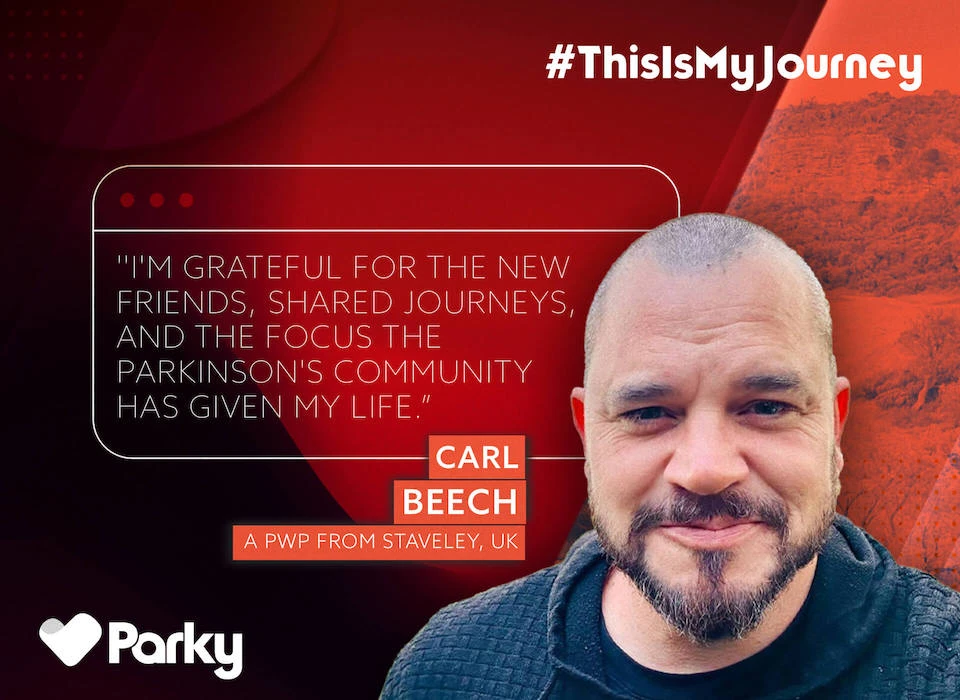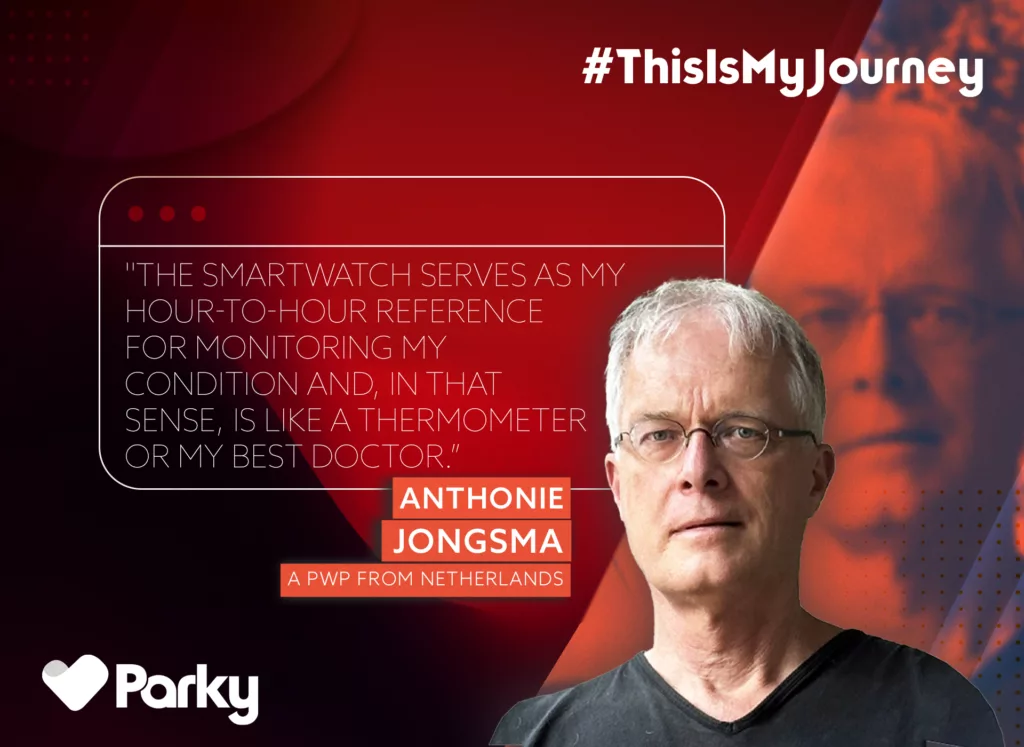

Anthonie Jongsma, a PwP from the Netherlands, began experiencing symptoms in May 2023 and was diagnosed with Parkinson's Disease in September 2023. Driven by a profound understanding of the impact of gut health and a desire to alleviate his symptoms, Anthonie undertook a private analysis of his microbiome, which led him to make significant dietary changes. In his journey, he recognizes the potential of technology. He began using self-tracking apps and a smartwatch to monitor his symptoms meticulously. This personalized data collection allows Anthonie to correlate his symptoms with various factors such as diet, exercise, and stress, providing him with invaluable insights and enabling more informed discussions with his neurologist.
Anthonie is a remarkable advocate for the importance of pattern recognition and individualized approaches in managing his condition. His commitment to accessing his daily data underscores his belief in empowering patients to develop personalized management strategies and contribute to the broader understanding of Parkinson's Disease.
I began experiencing symptoms in May 2023 and was diagnosed in September 2023. The primary symptom is a resting tremor in my right hand. Despite this, my movement remains unaffected, and I can perform my office work without any issues. Additionally, I have occasionally experienced acting out dreams, although this symptom is not very frequent.
For two years prior to my diagnosis, I hadn't felt fit and explored other potential causes, which all came back negative. Once I received my diagnosis, I delved into the scientific literature and became fascinated by the proposed link to the gut microbiome as I had clearly developed bowel issues prior to diagnosis. Consequently, I began taking prebiotic and probiotic supplements. Among these, magnesium threonate 500 mg tablets significantly improved my mental clarity and endurance. I also found literature suggesting substantial benefits from fecal microbiota transplants (FMT). However, organizing FMT is challenging, and it currently lacks support from the neurology profession.
Understanding the impact of gut health, particularly constipation and a microbiome imbalance that could lead to leaky gut syndrome, I decided to privately analyze my microbiome. This analysis supported the possibility that my issues might originate in my gut and that addressing this could alleviate my symptoms. Consequently, I made a significant change to my diet, replacing my usual breakfast of bread and sweets with germinated mung beans, hummus, and hot spices, and started using oat milk in my coffee.
In early December, I discovered Parkinson's Disease (PD) self-tracking apps and purchased a smartwatch to monitor my symptoms. The graphs provided by these tools have been very reassuring, as they allow me to track the effects of various interventions, such as dietary changes, exercise and recently medication. But also the effects of stress as a major factor.
I have modified my breakfast routine and now take several supplements each morning. These include high doses of vitamin D3, B complex, and K2, next to a regular vitamin mixture, magnesium threonate, inulin (to feed the good microbes), and omega-3 fish oil. However, I did not take any Parkinson's disease medication for the first 6 months.
I learned about the gut health benefits of drinking kefir and started brewing my own water kefir. In early January, I observed a significant improvement: my daily tremor duration decreased from a stable three hours to just one hour for about 4 weeks. This was an exciting development, suggesting that dietary interventions, especially with probiotics, could significantly reduce my tremor symptoms. I contacted neurologists in the city where I live, who are interested in following up on my observations to see if these results are reproducible in others and indeed correlated to kefir intake. Since then I have seen a steady linear increase again in my tremor levels from 1 hour then to 5 hours now. So if anything the probiotic didn’t stop the progression, but it may have attenuated the tremor. For a month I am now taking levodopa/carbidopa. It seems to reduce the intensity of my tremor but not the total duration and is only visible as a multi-day trend and not in the per-hour or 15-minute stats.
The smartwatch serves as my hour-to-hour reference for monitoring my condition and, in that sense, is like a thermometer or my best doctor. Generally, I find that the app helps to quantify the effect of the medication (if any) and support any needed change. So the discussion with my neurologist is now also supported by objective data.
I have been tracking myself 23 hours a day for the past 7 months and have arranged access to the raw data. This raw data provides deeper insights into my condition, such as different tremor intensities. For example, I noticed a shift from mild to slight tremors when I changed my diet and a strong reduction in tremor duration coinciding with Kefir. This data also allowed me to create various plot types, including daily and multi-day averages to remove fluctuations and better observe long-term trends. Additionally, I correlate my tremor data with Health Kit statistics, such as exercise time, steps, and sleep, to observe the influence of these parameters. So I would strongly advocate that the Parkinson’s apps that are around allow every patient access to a spreadsheet of their own data, like I have now, and like also the Apple Health app already offers. In that way, the PD community can develop analytical tools that are too elaborate for the app itself and allow enthusiasts like me to delve deeper into their own data.
My watch and self-tracking apps have allowed me to observe changes in my tremor that would have otherwise gone unnoticed. This makes the apps incredibly valuable, especially when combined with detailed recordings of daily routine changes and medication.
After reading hundreds of papers on the topic, I have become much more aware of the importance of a healthy diet and, consequently, a healthy gut for aging well. Many diseases, such as metabolic syndrome and neurological disorders like Alzheimer’s and Parkinson’s Disease, have roots in diet and gut health. The smartwatch has been invaluable in monitoring and motivating me to initiate some lifestyle changes.
I initially began with a large number of supplements, but I now believe that changing one’s diet and achieving regular bowel movements should be the top priority. I am very interested in hearing from others about any effects they experience from consuming 2-3 glasses of water or milk kefir on their symptoms. So please record clearly when you start taking that and reach out if you think you see some effects.
While it is clear that my very low January tremor level has gradually increased again, I think that without dietary intervention, things could be much worse and these things are best observed before taking the levodopa medicine. The positive news is that symptoms can be reduced by leading a healthier, active lifestyle and the Parkinson’s self-tracking app is a great objective observer and motivator for this. Additionally, I would say a microbiome analysis can be motivating, as it may highlight the need for change if the report indicates a poor state of gut health.
Join our community in spreading hope and strength. Tell us your unique journey with Parkinson's to uplift and empower others.